-
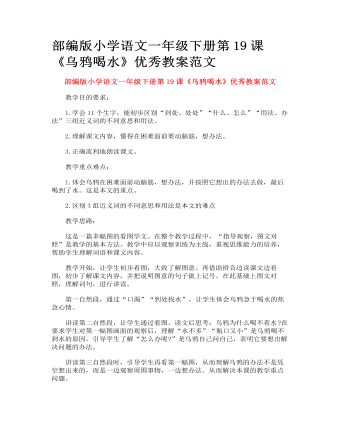
部编版小学语文一年级下册第19课《乌鸦喝水》优秀教案范文
教学思路: 这是一篇多幅图的看图学文。在整个教学过程中,“指导观察,图文对照”是教学的基本方法。教学中应以观察训练为主线,重视思维能力的培养,帮助学生理解词语和课文内容。 教学开始,让学生初步看图,大致了解图意。再借助拼音边读课文边看图,初步了解课文内容,并把说明图意的句子做上记号。在此基础上图文对照,理解词句,进行讲读。 第一自然段,通过“口渴”“到处找水”,让学生体会乌鸦急于喝水的焦急心情。 讲读第二自然段,让学生通过看图、读文后思考:乌鸦为什么喝不着水?在要求学生对第一幅图画面的观察后,理解“水不多”“瓶口又小”是乌鸦喝不到水的原因。引导学生了解“怎么办呢?”是乌鸦自己问自己,表明它要想出解决问题的办法。 讲读第三自然段时,引导学生再看第一幅图,从而理解乌鸦的办法不是凭空想出来的,而是一边观察周围事物,一边想办法。从而解决本课的教学重点问题。
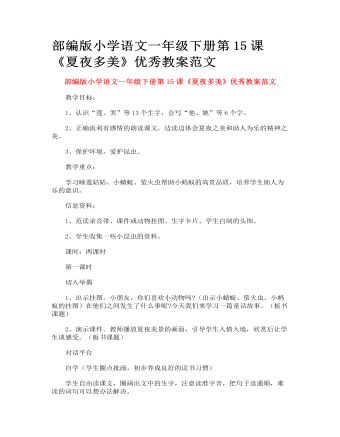
部编版小学语文一年级下册第15课《夏夜多美》优秀教案范文
1、检查读。教师以开火车的形式让学生按自然段读课文,看谁读得既正确又流利。 2、指正读。把你喜欢的小动物的话找出来读一读,教师随机指导。 3、想象读。先听范读录音,然后指名读文,边读边想象当时的情景。 4、分角色读。教师指导学生研究讨论每个角色的语气怎样读,并尝试给这些角色设计表情动作。 如:睡莲姑姑(奇怪的问):“小蚂蚁,你怎么了?” 小蚂蚁(揉肉眼睛,伤心的)说:“我不小心掉进池塘,上不了岸啦!” (让学生尝试添加提示语,是一个大胆的尝试。让学生根据生活经验和对课文的理解,给“人物”设计表情动作,添加不同的语气词,使课文变成了童话剧。由于是自己创造的成果,学生会读得有情有趣,有滋有味。但这种能力的培养不是一朝一夕的,教师要有意识的加以引导。)
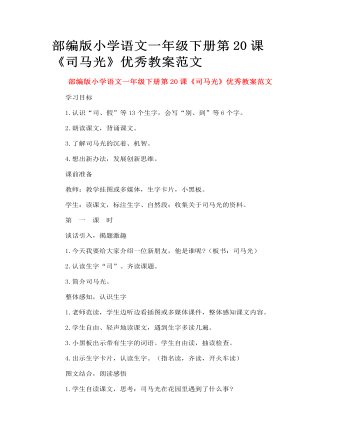
部编版小学语文一年级下册第20课《司马光》优秀教案范文
学习课文第一段。 (1)指名读,其他同学边听边想:这段主要讲的是谁?讲了他什么事?引导学生感知这段的主要内容。 (2)读第1句话,回答曹操是什么时候的人?理解“古时候”指三国时期,离现在大约有一千七百多年。 (3)读第2、3句,回答:人家送给他一头大象,他心情怎样?是怎样做的?(他很高兴,所以就带着官员和儿子去看象) (4)指导朗读。学习第二段 (1)指名读第2段,思考并回答:象是什么样子?官员们怎么做的?(使学生了解本段主要写了象又高又大,官员们边看边议论象的重量)。 (2)读第1句,看图回答:从哪地方看出象又高又大? 理解“身子像堵墙,腿像四根柱子”的意思,具体认识象的高大。 (3)再读课文,从中体会象很大。 (4)读第2句话,举例说说“议论”的意思,再回答:从官员们议论的话里你知道了什么?(象很重,官员们很想知道象有多重)。 再读这句话,读出官员们疑问语气。 (5)朗读第2段。
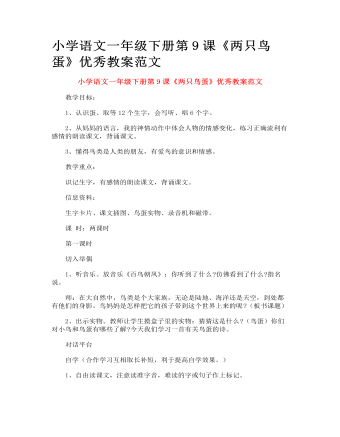
小学语文一年级下册第9课《两只鸟蛋》优秀教案范文
朗读(读说思议练结合,培养学生语文综合能力。) 1、学习第一小节: (1)指名读,回忆刚才摸鸟蛋的感觉(小小的、凉凉的)体会着读一读。 (2)比较“鸟蛋凉凉的”和“凉凉的鸟蛋”:你发现了什么?(引导学生发现这类词语的特点:词序不同,但表达的意思相同。)除了凉凉的鸟蛋还有什么是凉凉的? (3)你还能像这样再说几个吗? (如果学生说不出来,教师可进行指导,把写有“花儿、小草、柳枝、大海,红红的、绿绿的、软软的、蓝蓝的”的词语卡分给学生,让拥有不同词语的学生去找朋友,再让两个朋友变换左右顺序。) 2、学习第二小节: (1)轻声读文,思考:你怎么知道两只鸟蛋就是两只小鸟? (2)出示小鸟破壳的图片或课件,引导学生说一说。 (3)启发想象:鸟妈妈焦急不安是什么样?你能表演一下吗? 表演后试着把妈妈的语气读出来。 (4)你还能用焦急不安说句话吗?看谁说得和别人不一样? 背诵(采用多种形式调动学生背诵积极性,帮助学生有意识地积累语言。) 练习有感情的背诵前两个小节。
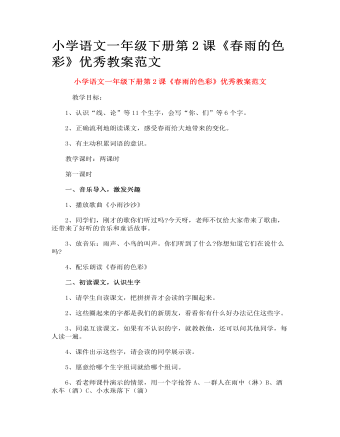
小学语文一年级下册第2课《春雨的色彩》优秀教案范文
精读课文,理解积累 1、同学们的字记的很好,课文也一定能读出感情来。现在就请同学们带着自己的理解和感受,有感情地读一遍课文,并自己喜欢的一段精读。 2、讨论交流,指导朗读 调整方案: 方案一:通过读文你知道了什么?(这一问题较开放,如果学生已从整体上感知课文内容,即可进入下一环节。如果学生回答只停留在零散的词句上,就按方案二教学。) 方案二:小燕子、麻雀和黄莺它们分别认为春雨是什么色的?他们为什么这么认为?(板贴写有字的小写图片和对应的颜色) 3、小组内讨论:a.如果分角色朗读的话,该怎样读争论的语法,朗读好“不对”“不对,不对”“你们瞧”b.怎样表现春雨小鸟和大自然。 4、根据自己的理解感受小组内分角色读、表演读。 5、请一组同学配乐表演读,学生评价 6、同学们春雨到底是什么颜色的呢?把你的想法说一说,画一画(自选粉笔板画春雨) 7、指导积累。同学们读得真有感情,现在请把你喜欢的词句画下来。
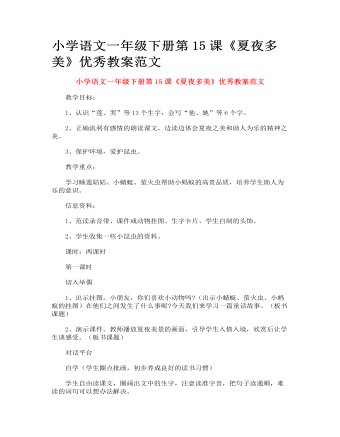
小学语文一年级下册第15课《夏夜多美》优秀教案范文
朗读(多层次自主阅读,拓展思维空间,提高阅读质量。) 1、检查读。教师以开火车的形式让学生按自然段读课文,看谁读得既正确又流利。 2、指正读。把你喜欢的小动物的话找出来读一读,教师随机指导。 3、想象读。先听范读录音,然后指名读文,边读边想象当时的情景。 4、分角色读。教师指导学生研究讨论每个角色的语气怎样读,并尝试给这些角色设计表情动作。 如:睡莲姑姑(奇怪的问):“小蚂蚁,你怎么了?” 小蚂蚁(揉肉眼睛,伤心的)说:“我不小心掉进池塘,上不了岸啦!” (让学生尝试添加提示语,是一个大胆的尝试。让学生根据生活经验和对课文的理解,给“人物”设计表情动作,添加不同的语气词,使课文变成了童话剧。由于是自己创造的成果,学生会读得有情有趣,有滋有味。但这种能力的培养不是一朝一夕的,教师要有意识的加以引导。)
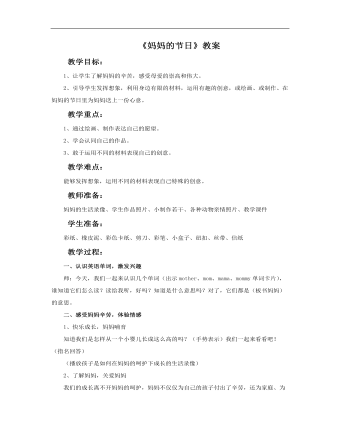
小学美术人教版一年级下册《第12课妈妈的节日》教案
教学重点:1、通过绘画、制作表达自己的愿望。2、学会认同自己的作品。3、敢于运用不同的材料表现自己的创意。教学难点:能够发挥想象,运用不同的材料表现自己特殊的创意。教师准备:妈妈的生活录像、学生作品照片、小制作若干、各种动物亲情照片、教学课件学生准备:彩纸、橡皮泥、彩色卡纸、剪刀、彩笔、小盒子、纽扣、丝带、信纸
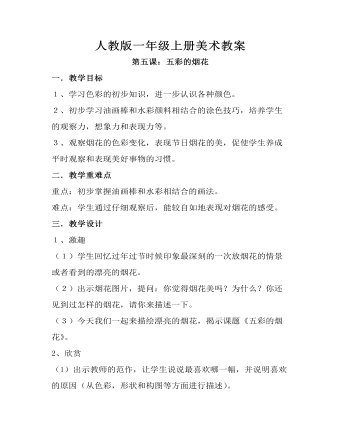
小学美术人教版一年级上册《第5课五彩的烟花》教案
二.教学重难点重点:初步掌握油画棒和水彩相结合的画法。难点:学生通过仔细观察后,能较自如地表现对烟花的感受。三.教学设计1、激趣(1)学生回忆过年过节时候印象最深刻的一次放烟花的情景或者看到的漂亮的烟花。(2)出示烟花图片,提问:你觉得烟花美吗?为什么?你还见到过怎样的烟花,请你来描述一下。(3)今天我们一起来描绘漂亮的烟花,揭示课题《五彩的烟花》。
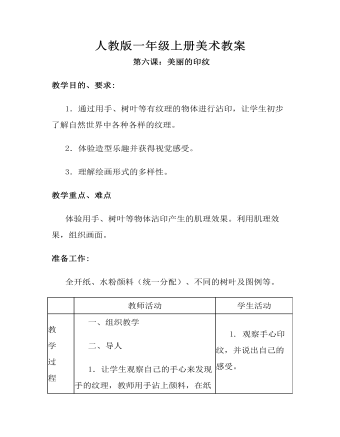
小学美术人教版一年级上册《第6课美丽的印纹》教案
3.让学生讨论并说说除了手之外,还可以用什么东西来印。三、布置作业1.团结协作;2.注意卫生;3.比一比,哪一组印得最美丽。
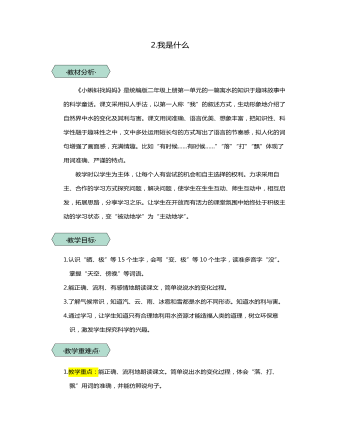
统编版二年级语文上第2课我是什么教学设计教案
《小蝌蚪找妈妈》是统编版二年级上册第一单元的一篇寓水的知识于趣味故事中的科学童话。课文采用拟人手法,以第一人称“我”的叙述方式,生动形象地介绍了自然界中水的变化及其利与害。课文用词准确、语言优美、想象丰富,把知识性、科学性融于趣味性之中,文中多处运用短长句的方式写出了语言的节奏感,拟人化的词句增强了画面感,充满情趣。比如“有时候……有时候……”“落”“打”“飘”体现了用词准确、严谨的特点。教学时以学生为主体,让每个人有尝试的机会和自主选择的权利。力求采用自主、合作的学习方式探究问题,解决问题,使学生在生生互动、师生互动中,相互启发,拓展思路,分享学习之乐。让学生在开放而有活力的课堂氛围中始终处于积极主动的学习状态,变“被动地学”为“主动地学”。 ·教学目标· 1.认识“晒、极”等15个生字,会写“变、极”等10个生字,读准多音字“没”。掌握“天空、傍晚”等词语。2.能正确、流利、有感情地朗读课文,简单说说水的变化过程。3.了解气候常识,知道汽、云、雨、冰雹和雪都是水的不同形态。知道水的利与害。4.通过学习,让学生知道只有合理地利用水资源才能造福人类的道理,树立环保意识,激发学生探究科学的兴趣。 ·教学重难点· 1.教学重点:能正确、流利地朗读课文。简单说出水的变化过程,体会“落、打、飘”用词的准确,并能仿照说句子。2.教学难点:了解气候常识,知道汽、云、雨、冰雹和雪都是水的不同形态。知道水的利与害。
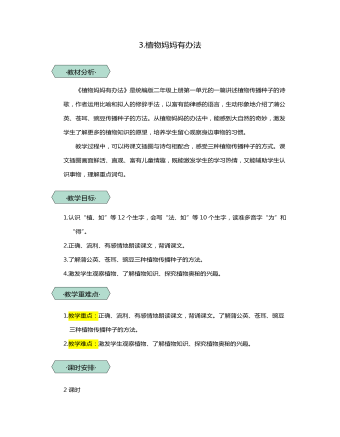
统编版二年级语文上第3课植物妈妈有办法教学设计教案
《植物妈妈有办法》是统编版二年级上册第一单元的一篇讲述植物传播种子的诗歌,作者运用比喻和拟人的修辞手法,以富有韵律感的语言,生动形象地介绍了蒲公英、苍耳、豌豆传播种子的方法。从植物妈妈的办法中,能感到大自然的奇妙,激发学生了解更多的植物知识的愿望,培养学生留心观察身边事物的习惯。教学过程中,可以将课文插图与诗句相配合,感受三种植物传播种子的方式。课文插图画面鲜活、直观、富有儿童情趣,既能激发学生的学习热情,又能辅助学生认识事物,理解重点词句。 1.认识“植、如”等12个生字,会写“法、如”等10个生字,读准多音字“为”和“得”。2.正确、流利、有感情地朗读课文,背诵课文。3.了解蒲公英、苍耳、豌豆三种植物传播种子的方法。4.激发学生观察植物、了解植物知识、探究植物奥秘的兴趣。 1.教学重点:正确、流利、有感情地朗读课文,背诵课文。了解蒲公英、苍耳、豌豆三种植物传播种子的方法。2.教学难点:激发学生观察植物、了解植物知识、探究植物奥秘的兴趣。 2课时
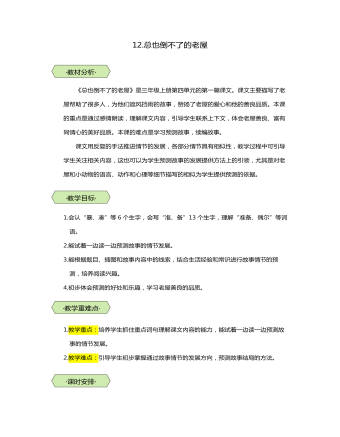
统编版三年级语文上第12课总也倒不了的老屋教学设计教案
《总也倒不了的老屋》是三年级上册第四单元的第一篇课文。课文主要描写了老屋帮助了很多人,为他们遮风挡雨的故事,赞扬了老屋的爱心和他的善良品质。本课的重点是通过感情朗读,理解课文内容,引导学生联系上下文,体会老屋善良、富有同情心的美好品质。本课的难点是学习预测故事,续编故事。课文用反复的手法推进情节的发展,各部分情节具有相似性,教学过程中可引导学生关注相关内容,这也可以为学生预测故事的发展提供方法上的引领,尤其是对老屋和小动物的语言、动作和心理等细节描写的相似为学生提供预测的依据。 1.会认“暴、凑”等6个生字,会写“准、备”13个生字,理解“准备、偶尔”等词语。2.能试着一边读一边预测故事的情节发展。3.能根据题目、插图和故事内容中的线索,结合生活经验和常识进行故事情节的预测,培养阅读兴趣。4.初步体会预测的好处和乐趣,学习老屋善良的品质。 1.教学重点:培养学生抓住重点词句理解课文内容的能力,能试着一边读一边预测故事的情节发展。2.教学难点:引导学生初步掌握通过故事情节的发展方向,预测故事结局的方法。 2课时
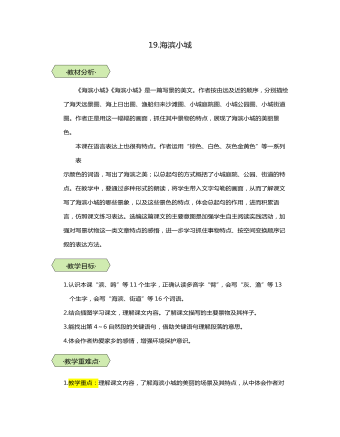
统编版三年级语文上第19课海滨小城教学设计教案
《海滨小城》《海滨小城》是一篇写景的美文。作者按由远及近的顺序,分别描绘了海天远景图、海上日出图、渔船归来沙滩图、小城庭院图、小城公园图、小城街道图。作者正是用这一幅幅的画面,抓住其中景物的特点,展现了海滨小城的美丽景色。本课在语言表达上也很有特点。作者运用“棕色、白色、灰色金黄色”等一系列表示颜色的词语,写出了海滨之美;以总起句的方式概括了小城庭院、公园、街道的特点。在教学中,要通过多种形式的朗读,将学生带入文字勾勒的画面,从而了解课文写了海滨小城的哪些景象,以及这些景色的特点,体会总起句的作用,进而积累语言,仿照课文练习表达。选编这篇课文的主要意图是加强学生自主阅读实践活动,加强对写景状物这一类文章特点的感悟,进一步学习抓住事物特点、按空间变换顺序记叙的表达方法。 1.认识本课“滨、鸥”等11个生字,正确认读多音字“臂”,会写“灰、渔”等13个生字,会写“海滨、街道”等16个词语。2.结合插图学习课文,理解课文内容。了解课文描写的主要景物及其样子。3.能找出第4~6自然段的关键语句,借助关键语句理解段落的意思。4.体会作者热爱家乡的感情,增强环境保护意识。 1.教学重点:理解课文内容,了解海滨小城的美丽的场景及其特点,从中体会作者对家乡的热爱之情。2.教学难点:能通过学习课文,体会作者热爱家乡的感情,增强环境保护意识。 2课时
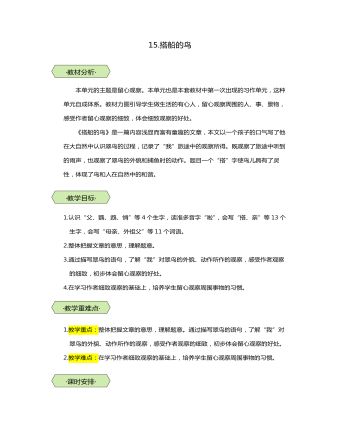
统编版三年级语文上第15课搭船的鸟教学设计教案
本单元的主题是留心观察。本单元也是本套教材中第一次出现的习作单元,这种单元自成体系。教材力图引导学生做生活的有心人,留心观察周围的人、事、景物,感受作者留心观察的细致,体会细致观察的好处。《搭船的鸟》是一篇内容浅显而富有童趣的文章,本文以一个孩子的口气写了他在大自然中认识翠鸟的过程,记录了“我”旅途中的观察所得。既观察了旅途中听到的雨声,也观察了翠鸟的外貌和捕鱼时的动作。题目一个“搭”字使鸟儿具有了灵性,体现了鸟和人在自然中的和谐。 1.认识“父、鹦、鹉、悄”等4个生字,读准多音字“啦”,会写“搭、亲”等13个生字,会写“母亲、外祖父”等11个词语。2.整体把握文章的意思,理解题意。3.通过描写翠鸟的语句,了解“我”对翠鸟的外貌、动作所作的观察,感受作者观察的细致,初步体会留心观察的好处。4.在学习作者细致观察的基础上,培养学生留心观察周围事物的习惯。 1.教学重点:整体把握文章的意思,理解题意。通过描写翠鸟的语句,了解“我”对翠鸟的外貌、动作所作的观察,感受作者观察的细致,初步体会留心观察的好处。2.教学难点:在学习作者细致观察的基础上,培养学生留心观察周围事物的习惯。 2课时
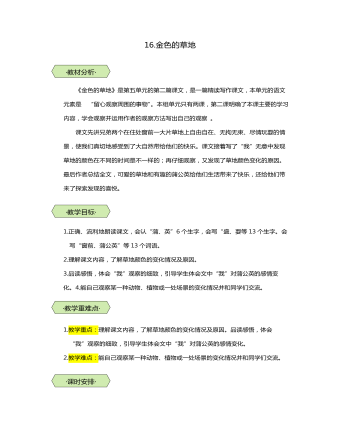
统编版三年级语文上第16课金色的草地教学设计教案
《金色的草地》是第五单元的第二篇课文,是一篇精读写作课文,本单元的语文元素是 “留心观察周围的事物”。本组单元只有两课,第二课明确了本课主要的学习内容,学会观察并运用作者的观察方法写出自己的观察。课文先讲兄弟两个在住处窗前一大片草地上自由自在、无拘无束、尽情玩耍的情景,使我们真切地感受到了大自然带给他们的快乐。课文接着写了“我”无意中发现草地的颜色在不同的时间是不一样的;再仔细观察,又发现了草地颜色变化的原因。最后作者总结全文,可爱的草地和有趣的蒲公英给他们生活带来了快乐,还给他们带来了探索发现的喜悦。 1.正确、流利地朗读课文,会认“蒲、英”6个生字,会写“盛、耍等13个生字。会写“窗前、蒲公英”等13个词语。2.理解课文内容,了解草地颜色的变化情况及原因。3.品读感悟,体会“我”观察的细致,引导学生体会文中“我”对蒲公英的感情变化。4.能自己观察某一种动物、植物或一处场景的变化情况并和同学们交流。 1.教学重点:理解课文内容,了解草地颜色的变化情况及原因。品读感悟,体会“我”观察的细致,引导学生体会文中“我”对蒲公英的感情变化。2.教学难点:能自己观察某一种动物、植物或一处场景的变化情况并和同学们交流。 2课时
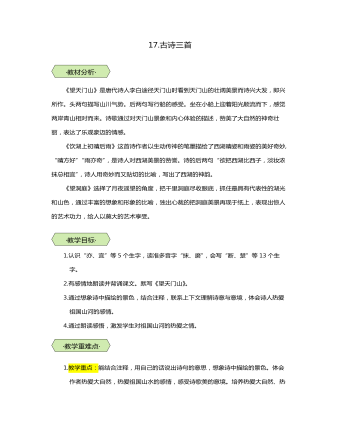
统编版三年级语文上第17课古诗三首教学设计教案
《望天门山》是唐代诗人李白途径天门山时看到天门山的壮阔美景而诗兴大发,即兴所作。头两句描写山川气势。后两句写行船的感受。坐在小船上迎着阳光顺流而下,感觉两岸青山相对而来。诗歌通过对天门山景象和内心体验的描述,赞美了大自然的神奇壮丽,表达了乐观豪迈的情感。《饮湖上初晴后雨》这首诗作者以生动传神的笔墨描绘了西湖晴姿和雨姿的美好奇妙,?“晴方好”“雨亦奇”,是诗人对西湖美景的赞誉。诗的后两句“欲把西湖比西子,淡妆浓抹总相宜”,诗人用奇妙而又贴切的比喻,写出了西湖的神韵。《望洞庭》选择了月夜遥望的角度,把千里洞庭尽收眼底,抓住最具有代表性的湖光和山色,通过丰富的想象和形象的比喻,独出心裁的把洞庭美景再现于纸上,表现出惊人的艺术功力,给人以莫大的艺术享受。 1.认识“亦、宜”等5个生字,读准多音字“抹、磨”,会写“断、楚”等13个生字。2.有感情地朗读并背诵课文。默写《望天门山》。3.通过想象诗中描绘的景色,结合注释,联系上下文理解诗意与意境,体会诗人热爱祖国山河的感情。4.通过朗读感悟,激发学生对祖国山河的热爱之情。 1.教学重点:能结合注释,用自己的话说出诗句的意思,想象诗中描绘的景色。体会作者热爱大自然,热爱祖国山水的感情,感受诗歌美的意境。培养热爱大自然、热爱祖国的情感。2.教学难点:体会诗文的内容,体会诗人的思想感情。 3课时
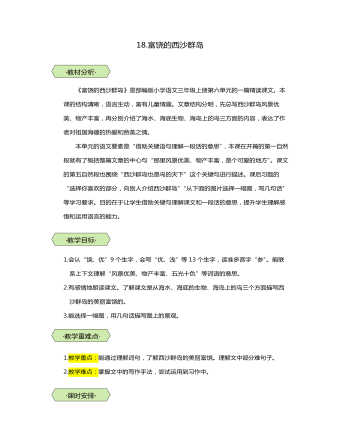
统编版三年级语文上第18课富饶的西沙群岛教学设计教案
《富饶的西沙群岛》是部编版小学语文三年级上册第六单元的一篇精读课文。本课的结构清晰,语言生动,富有儿童情趣。文章结构分明,先总写西沙群岛风景优美、物产丰富,再分别介绍了海水、海底生物、海岛上的鸟三方面的内容,表达了作者对祖国海疆的热爱和赞美之情。本单元的语文要素是“借助关键语句理解一段话的意思”,本课在开篇的第一自然段就有了概括整篇文章的中心句“那里风景优美、物产丰富,是个可爱的地方”。课文的第五自然段也围绕“西沙群岛也是鸟的天下”这个关键句进行描述。课后习题的“选择你喜欢的部分,向别人介绍西沙群岛”“从下面的图片选择一幅图,写几句话”等学习要求。目的在于让学生借助关键句理解课文和一段话的意思,提升学生理解感悟和运用语言的能力。 1.会认“饶、优”9个生字,会写“优、浅”等13个生字,读准多音字“参”。能联系上下文理解“风景优美、物产丰富、五光十色”等词语的意思。2.有感情地朗读课文。了解课文是从海水、海底的生物、海岛上的鸟三个方面描写西沙群岛的美丽富饶的。3.能选择一幅图,用几句话描写图上的景观。 1.教学重点:能通过理解词句,了解西沙群岛的美丽富饶。理解文中部分难句子。2.教学难点:掌握文中的写作手法,尝试运用到习作中。 2课时
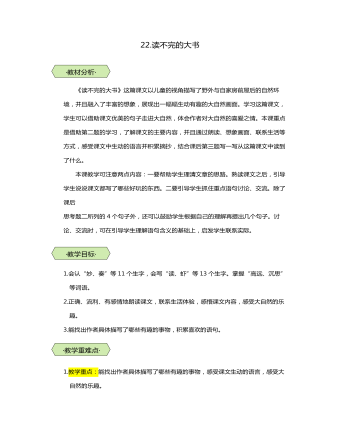
统编版三年级语文上第22课读不完的大书教学设计教案
《读不完的大书》这篇课文以儿童的视角描写了野外与自家房前屋后的自然环境,并且融入了丰富的想象,展现出一幅幅生动有趣的大自然画面。学习这篇课文,学生可以借助课文优美的句子走进大自然,体会作者对大自然的喜爱之情。本课重点是借助第二题的学习,了解课文的主要内容,并且通过朗读、想象画面、联系生活等方式,感受课文中生动的语言并积累摘抄,结合课后第三题写一写从这篇课文中读到了什么。本课教学可注意两点内容:一要帮助学生理清文章的思路。熟读课文之后,引导学生说说课文都写了哪些好玩的东西。二要引导学生抓住重点语句讨论、交流。除了课后思考题二所列的4个句子外,还可以鼓励学生根据自己的理解再提出几个句子。讨论、交流时,可在引导学生理解语句含义的基础上,启发学生联系实际。 1.会认“妙、奏”等11个生字,会写“读、虾”等13个生字。掌握“高远、沉思”等词语。2.正确、流利、有感情地朗读课文,联系生活体验,感悟课文内容,感受大自然的乐趣。3.能找出作者具体描写了哪些有趣的事物,积累喜欢的语句。 1.教学重点:能找出作者具体描写了哪些有趣的事物,感受课文生动的语言,感受大自然的乐趣。2.教学难点:能简单地写出自己感受到的大自然的乐趣,并和同学交流。 2课时
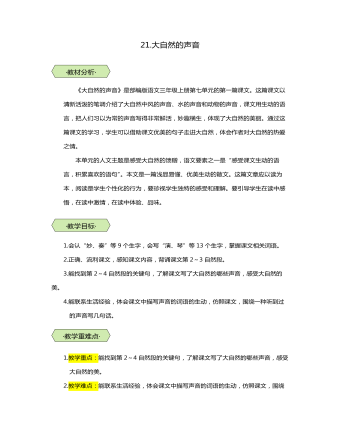
统编版三年级语文上第21课大自然的声音教学设计教案
《大自然的声音》是部编版语文三年级上册第七单元的第一篇课文。这篇课文以清新活泼的笔调介绍了大自然中风的声音、水的声音和动物的声音,课文用生动的语言,把人们习以为常的声音写得非常鲜活,妙趣横生,体现了大自然的美丽。通过这篇课文的学习,学生可以借助课文优美的句子走进大自然,体会作者对大自然的热爱之情。本单元的人文主题是感受大自然的馈赠,语文要素之一是“感受课文生动的语言,积累喜欢的语句”。本文是一篇浅显易懂、优美生动的散文。这篇文章应以读为本,阅读是学生个性化的行为,要珍视学生独特的感受和理解。要引导学生在读中感悟,在读中激情,在读中体验、品味。 1.会认“妙、奏”等9个生字,会写“演、琴”等13个生字,掌握课文相关词语。2.正确、流利课文,感知课文内容,背诵课文第2~3自然段。3.能找到第2~4自然段的关键句,了解课文写了大自然的哪些声音,感受大自然的美。4.能联系生活经验,体会课文中描写声音的词语的生动,仿照课文,围绕一种听到过的声音写几句话。 1.教学重点:能找到第2~4自然段的关键句,了解课文写了大自然的哪些声音,感受大自然的美。2.教学难点:能联系生活经验,体会课文中描写声音的词语的生动,仿照课文,围绕一种听到过的声音写几句话。 2课时
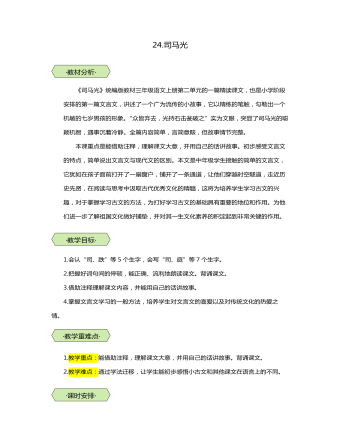
统编版三年级语文上第24课司马光教学设计教案
《司马光》统编版教材三年级语文上册第二单元的一篇精读课文,也是小学阶段安排的第一篇文言文,讲述了一个广为流传的小故事,它以精练的笔触,勾勒出一个机敏的七岁男孩的形象。“众皆弃去,光持石击瓮破之”实为文眼,突显了司马光的聪颖机智,遇事沉着冷静。全篇内容简单,言简意赅,但故事情节完整。本课重点是能借助注释,理解课文大意,并用自己的话讲故事。初步感受文言文的特点,简单说出文言文与现代文的区别。本文是中年级学生接触的简单的文言文,它犹如在孩子面前打开了一扇窗户,铺开了一条通道,让他们穿越时空隧道,走近历史先贤,在阅读与思考中汲取古代优秀文化的精髓,这将为培养学生学习古文的兴趣,对于掌握学习古文的方法,为打好学习古文的基础具有重要的地位和作用。为他们进一步了解祖国文化做好铺垫,并对其一生文化素养的积淀起到非常关键的作用。 1.会认“司、跌”等5个生字,会写“司、庭”等7个生字。2.把握好词句间的停顿,能正确、流利地朗读课文。背诵课文。3.借助注释理解课文内容,并能用自己的话讲故事。4.掌握文言文学习的一般方法,培养学生对文言文的喜爱以及对传统文化的热爱之情。 1.教学重点:能借助注释,理解课文大意,并用自己的话讲故事。背诵课文。2.教学难点:通过学法迁移,让学生能初步感悟小古文和其他课文在语言上的不同。 2课时

